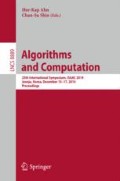Abstract
Triple patterning lithography (TPL) is one of the major techniques for 14 nm technology node and beyond. This paper discusses TPL layout decomposition which maximizes objective value representing decomposition quality. We introduce a maximization problem of the weighted sum of resolved conflicts and unused stitch candidates. We propose a polynomial time (7/9)-approximation algorithm based on positive semidefinite relaxation and randomized rounding procedure.
Our algorithm returns a decomposition such that the expectation of the corresponding objective value is at least \((7/9)\) times the optimal value even in the worst case problem instance. To our knowledge, the result is the first approximation algorithm with a constant approximation ratio for TPL.
Access this chapter
Tax calculation will be finalised at checkout
Purchases are for personal use only
Preview
Unable to display preview. Download preview PDF.
References
Bansal, N., Blum, A., Chawla, S.: Correlation clustering. In: Proc. IEEE Symposium on Foundations of Computer Science (FOCS), pp. 238–250 (2002)
Fang, S.-Y., Chang, Y.-W., Chen, W.-Y.: A novel layout decomposition algorithm for triple patterning lithography. In: Proc. ACM/IEEE Design Automation Conference (DAC), pp. 1181–1186 (2012)
Garey, M.R., Johnson, D.S.: Computers and Intractability. A Guide to the Theory of NP-Completeness. Freeman and Co., New York (1979)
Goemans, M.X., Williamson, D.P.: Improved approximation algorithms for maximum cut and satisfiability problems using semidefinite programming. Journal of the ACM 42, 1115–1145 (1995)
Kuang, J., Young, E.: An efficient layout decomposition approach for triple patterning lithography. In: Proc. ACM/IEEE Design Automation Conference (DAC), pp. 1–6 (2013)
Lin, Y.-H., Yu, B., Pan, D.Z., Li, Y.-L.: TRIAD: a triple patterning lithography aware detailed router. In: Proc. IEEE/ACM International Conference on Computer Aided Design (ICCAD), pp. 123–129 (2012)
Ma, Q., Zhang, H., Wong, M.D.F.: Triple patterning aware routing and its comparison with double patterning aware routing in 14 nm technology. In: Proc. ACM/IEEE Design Automation Conference (DAC), pp. 591–596 (2012)
Swamy, C.: Correlation clustering: maximizing agreements via semidefinite programming. In: Proc. ACM-SIAM Symposium on Discrete Algorithms (SODA), pp. 526–527 (2004)
Tian, H., Du, Y., Zhang, H., Xiao, Z., Wong, M.D.F.: Constrained pattern assignment for standard cell based triple patterning lithography. In: Proc. IEEE/ACM International Conference on Computer Aided Design (ICCAD), pp. 178–185 (2013)
Tian, H., Zhang, H., Ma, Q., Xiao, Z., Wong, M.D.F.: A polynomial time triple patterning algorithm for cell based row-structure layout. In: Proc. IEEE/ACM International Conference on Computer Aided Design (ICCAD), pp. 57–64 (2012)
Yu, B., Gao, J.-R., Pan, D.Z.: Triple patterning lithography (TPL) layout decomposition using end-cutting. In: Proc. SPIE, vol. 8684, p. 86840G (2013)
Yu, B., Lin, Y.-H., Luk-Pat, G., Ding, D., Lucas, K., Pan, D.Z.: A high-performance triple patterning layout decomposer with balanced density. In: Proc. IEEE/ACM International Conference on Computer Aided Design (ICCAD), pp. 163–169 (2013)
Yu, B., Xu, X., Gao, J.-R., Pan, D.Z.: Methodology for standard cell compliance and detailed placement for triple patterning lithography. In: Proc. IEEE/ACM International Conference on Computer Aided Design (ICCAD), pp. 349–356 (2013)
Yu, B., Yuan, K., Zhang, B., Ding, D., Pan, D.Z.: Layout decomposition for triple patterning lithography. In: Proc. IEEE/ACM International Conference on Computer Aided Design (ICCAD), pp. 1–8 (2011)
Zhang, Y., Luk, W.-S., Zhou, H., Yan, C., Zeng, X.: Layout decomposition with pairwise coloring for multiple patterning lithography. In: Proc. IEEE/ACM International Conference on Computer Aided Design (ICCAD), pp. 170–177 (2013)
Author information
Authors and Affiliations
Corresponding author
Editor information
Editors and Affiliations
Rights and permissions
Copyright information
© 2014 Springer International Publishing Switzerland
About this paper
Cite this paper
Matsui, T., Kohira, Y., Kodama, C., Takahashi, A. (2014). Positive Semidefinite Relaxation and Approximation Algorithm for Triple Patterning Lithography. In: Ahn, HK., Shin, CS. (eds) Algorithms and Computation. ISAAC 2014. Lecture Notes in Computer Science(), vol 8889. Springer, Cham. https://doi.org/10.1007/978-3-319-13075-0_29
Download citation
DOI: https://doi.org/10.1007/978-3-319-13075-0_29
Published:
Publisher Name: Springer, Cham
Print ISBN: 978-3-319-13074-3
Online ISBN: 978-3-319-13075-0
eBook Packages: Computer ScienceComputer Science (R0)

